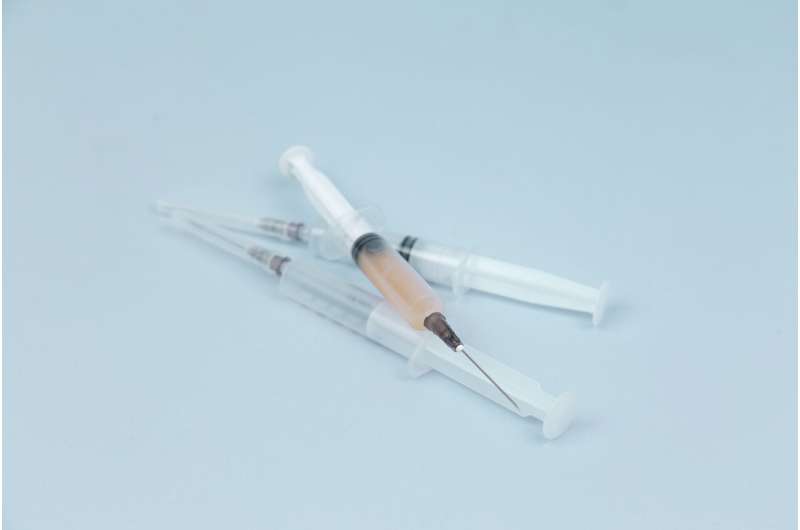This article has been reviewed according to Science X's editorial process and policies. Editors have highlighted the following attributes while ensuring the content's credibility:
fact-checked
trusted source
proofread
The latest in RSV protection for kids: An antibody treatment called Beyfortus

Parents in the U.S. can breathe a sigh of relief: The FDA has approved a new drug that can protect infants and toddlers from RSV (respiratory syncytial virus) throughout the virus season.
The monoclonal antibody nirsevimab, which will be sold under the brand name Beyfortus, is delivered in a single shot and will be available for infants ahead of the 2023–2024 RSV season.
Here's what parents and caregivers should know.
RSV is the leading cause of hospitalization in infants and one of the main drivers of child mortality
Nearly all children are infected with RSV by the time they turn 2. In most cases, the virus causes a fever, runny nose, and cough, symptoms that generally resolve within a couple weeks. But RSV can sometimes lead to respiratory distress or disrupt a baby's ability to feed, which can lead to other serious health problems.
Globally, RSV is a main driver of childhood pneumonia, one of the leading causes of death worldwide among children under 5; the vast majority—over 95%—of these deaths occur in low-and middle-income countries, noted Ruth Karron, MD, professor in International Health, in a webinar about vaccine innovations. RSV is also more likely than the flu to cause health problems for babies and young children.
Nirsevimab can protect babies throughout the duration of a virus season
In clinical trials, a single injection reduced the chances of severe infection requiring medical attention by 74.5%.
Until now, the only drug available to help prevent RSV was an antibody called Synagis (palivizumab), which required five monthly shots over the course of a virus season—and each shot could cost more than $1,000. Because of the price and logistics of delivery, the drug was available only for children with certain underlying medical conditions that put them at high risk of getting seriously ill from RSV.
Nirsevimab is not a vaccine. It's a preventive drug that offers passive immunity.
Monoclonal antibodies work by providing immediate and short-term protection, whereas vaccines "boost your immunity in the future," explains David Dowdy, MD, professor in Epidemiology. He explains that your immune system can't "learn" anything from an antibody. The drug is "basically to provide protection during a time of life when people are most vulnerable."
It should be noted that nirsevimab won't necessarily prevent all infections, but it can provide ample protection against severe infection and keep babies out of the hospital, which is the goal.
Infants also "aren't the primary drivers of RSV circulation," Dowdy says. "It's not like giving these antibodies just to infants will stop the natural cycles of RSV." For that, you'd need a vaccine. There are RSV vaccines currently available for adults over age 60, and experts hope to see general and pediatric vaccines available very soon.
There are promising advancements in passive immunization, or vaccinating pregnant people so they can pass on antibodies to the fetus. There is a challenge, however, in the U.S., according to Karron. "We don't do that well with maternal immunization," noting low rates of Tdap and influenza vaccination among pregnant people.
Prevention is essential because RSV-specific treatments don't exist
When kids get sick with the flu, the prescription antiviral drug Tamiflu can help treat it. But no such drugs exist for RSV. Parents can help ease symptoms by running a hot shower and sitting in the bathroom with the child to break up congestion. But if symptoms escalate to wheezing or labored breathing, a doctor can advise whether parents should take their child to the hospital for additional treatments.
RSV season is around the corner, so parents should check with their child's pediatrician about nirsevimab.
The CDC's Advisory Committee on Immunization Practices (ACIP) will convene on August 3 to evaluate and vote on recommendations for how Beyfortus, developed by AstraZeneca and Sanofi, should be administered. The medication will likely be available soon after that, and parents should ask their pediatricians as soon as possible if their child would benefit. Last year, RSV cases rose dramatically in October and spiked in November, so getting the shot early is ideal.


















